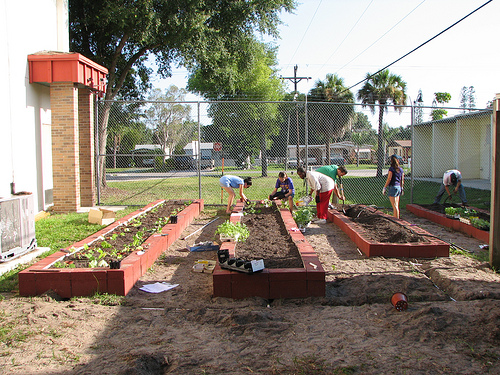According to a new Oxfam report, the global food system is broken and as a result, we are losing decades of progress against hunger.
The report, "Growing A Better Future," outlines the symptoms of today’s broken food system: growing hunger, flat-lining yields, a scramble for fertile land and water and rising food prices. The analysis shows that in the near future, depletion of natural resources and accelerating climate change will make it harder to feed a swelling human population.
To help address this crisis, Oxfam endorses a return to small-scale local farming as a way to provide communities with high quality, affordable food. In urban areas, community farms, balcony gardens and access to Community Supported Agriculture (CSAs) help people regain control of their diet while also bolstering a self-sufficient food system.
Coworking provides a nurturing community for members of the mobile workforce, but it's collaboration around values and ideas outside of the professional realm that allow coworking spaces to also meet the physical and emotional needs of today's freelancer.
At the 2011 Coworking UnConference in Austin, Texas, I had the opportunity to attend a session about ways the coworking movement could use its momentum to catalyze the shift to a more independent food system, especially in urban areas.
Leading the session was Devin Balkind, a member of the Sarapis Foundation which champions an innovative concept known as the free/libre/open source (FLO) movement (see a slideshow from the session here).
The FLO movement currently feeds the commons lots of great software and information, but it can also feed the commons amazing local food," said Balkind. "FLO Farming is the application of FLO methodology and philosophy for the purpose of creating wealth and wellness from abundant natural resources such as the sun and soil. It involves networking farmers, permaculturalists, biologists, engineers and others together so that they can collaborate on solutions for common challenges."
There are two reasons why coworkers are the ideal audience for the message of a more independent food system: 1) coworkers need to eat and since they're concentrated in a space together it's very economical for them to arrange group buying relationships with local farms. 2) coworkers value their independence and understand that to achieve true self-reliance, one must have the capacity to create food or create relationships with people who do.
And there's also a third opportunity for connection, though one that few (if any) coworking spaces are taking advantage of at this time: small farmers are ideal coworkers.
Farmers that visit urban areas to create connections with co-ops or distributors need a place to work, and coworking is the perfect home base for them. Likewise, coworkers that would love to get out of the city can benefit from the presence of small farmers in their midst. "Building relationships between coworking spaces and rural spaces simply expands the amount of spaces we can all inhabit," explains Balkind.
So what's the best way to get these two groups talking?
The Sarapis Foundation views coworking spaces as physical locations in the urban environment that can be tied to rural locations in new ways, redefining how urban and rural communities interact with each other.
"We think this interaction begins with making CSA shares and group buying highly accessible to coworkers, and gets deeper when we think about running buses between coworking spaces and farms and getting coworkers on the land," adds Balkind.
Even if there isn't a convenient community of small farmers with which a coworking space can form a reciprocal relationship, there are still ways that independent workers can help advance a more independent food system while supporting local agriculture.
Members of Philadelphia's popular Indy Hall recently organized Coseed–an event to teach people the fun and ease and benefits of container gardening. The event was hosted in collaboration with a local urban farm and art gardent, was very well attended, and became a great opportunity for members to bring their whole families to Indy Hall.









